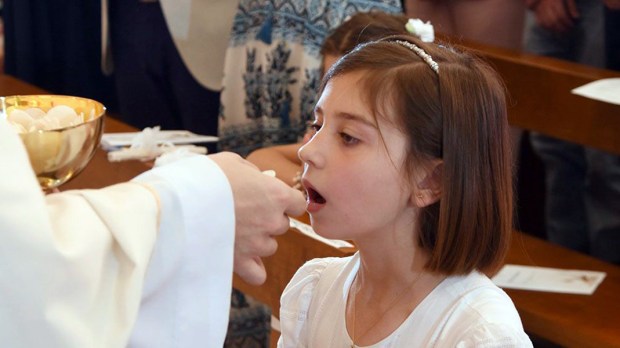Luke, who is 10 years-old, leaves the church after Mass. In front of the astonished eyes of one of his cousins, he pulls a host out of his pocket and, chuckling, says, “The body of Christ,” and pops it into his mouth. At communion, he hid the consecrated host in his pocket without anyone knowing and thought he was being clever by showing this off to his cousin. A sad feat, in truth, which clearly shows that Luke does not understand much about the Eucharist. This kind of behavior is not that uncommon, which should lead us to make a firm decision to teach children to respect the Eucharist.
Why should we respect consecrated hosts and wine?
The consecrated bread and wine are no longer bread and wine: they are the Body and Blood of Jesus.
“By the consecration of the bread and wine there takes place a change of the whole substance of the bread into the substance of the body of Christ our Lord and of the whole substance of the wine into the substance of his blood (…). The Eucharistic presence of Christ begins at the moment of the consecration and endures as long as the Eucharistic species subsist” says the Catechism of the Catholic Church, § 1376 and 1377. Gestures of adoration express and sustain our faith. We respect the Blessed Sacrament because we believe that Jesus is truly present there. But the reverse is also true: gestures of adoration help us to believe that the consecrated host is Jesus.
Certainly, Jesus is the All-Powerful One and we can be very informal with Him. But He is also the Most High, and this informality is ultimately adoration. This is especially true when He gives Himself to us in the Eucharist. Indeed, He chooses such commonplace foods that it is easy to forget that consecrated bread and wine are no longer bread and wine. Gestures of adoration help us enter into this reality which escapes our senses: Jesus is here.

Read more:
6 Things for children to know about the new saint, John Henry Newman
Remind children of some basic principles
In respect to the Eucharist, education begins long before one’s First Communion. When a small child sees his or her parents kneeling at the moment of consecration or after communion, they feel that this plain white host is not a simple piece of bread, it is something special. As they grow up, they naturally imitate the gestures and attitudes of their elders, and this corporal education is already a way of relating to the Eucharist.
Of course, physical gestures are not enough: Eucharistic catechesis cannot be limited to merely learning a certain attitude. This can turn into an empty habit. In fact, one can truly adore Jesus without kneeling down, but it is not Jesus who needs us to kneel: it is us. We are human beings, and it is indispensable for us to pray with our bodies. If we don’t make any gesture of adoration, and if we don’t teach this to our children, we will end up not knowing how to worship.
In preparation for First Communion we must insist on teaching respect for the Eucharist. Surrounding the moment of the consecration with a special solemnity, insisting on the proper gestures of communion, reminding the children of certain elementary rules — all of this is important.
Eucharistic fasting to prepare ourselves to receive Jesus
We should also not forget about fasting before taking Communion. The rules have been considerably relaxed (we are asked to abstain from all food and drink, except water and medicine, at least one hour before communion). Yet this fast is a very beautiful and physical, and therefore deeply human, way of preparing us to receive Jesus. Children are very capable of understanding its meaning and significance, provided that it is presented to them not as a formal obligation, but as an act of respect and love.
How we teach the Eucharist is everyone’s business: we should not hesitate to encourage reflection on the subject in our parish. What gesture of adoration should we propose to the children at the moment of consecration? How can we encourage recollection during communion? There are so many questions that call for concrete answers and, above all, a deepening of our faith in Jesus in the Eucharist.
Christine Ponsard

Read more:
Why did Jesus choose bread and wine for the Eucharist?

